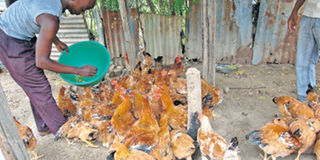Kienyeji chicken lays the golden egg for youths

A member of Tabora Youth Bunge Group, at their poultry farm in Mariakani, Kilifi County, with some of the birds they keep. GEORGE KIKAMI | NATION
What you need to know:
- The Diploma in Building Technology student says poultry is a business that has good returns if the birds are taken care of well.
- Dr William Kingi, chairman of Department of Business Studies Technical University of Mombasa, says to successfully venture into an agribusiness, one should have a business plan as a guide.
Irked by waste discharge from a hospital in Mariakani flowing towards their homes, Sila Mulwa and his friends decided to form a youth group to help protect the environment.
“It was in 2011. Our aim was to use the group to clean the environment and advocate for better environmental practices,” he says.
Out of the group, however, sprouted a thriving poultry business that is earning the youths good income.
“We thought of poultry because we wanted a business that would earn us income since most of us were in school,” explains Mulwa.
The 16-member group currently owns over 200 Kari Improved Kienyeji Chicken, which comprise of layers and broilers.
“Right now only 50 chickens are laying about 40 eggs daily. We sell each egg at Sh20,” says Mulwa.
However, broilers are their mainstay. “We sell each at between Sh800 and Sh1,000 when they mature. We keep the layers to supplement our income.”
The youths keep the birds on land offered by the mother of one of their members.
“He is called Philip Maranga. His mother offered us an eighth of an acre of her residential plot to keep the birds.” They have reciprocated by offering her 30 birds.
The Diploma in Building Technology student says poultry is a business that has good returns if the birds are taken care of well.
“Poultry is paying my fees and supports the rest of us to meet our needs. It has made us reduce our dependence on our parents,” says the 31-year-old.
“We will be able to complete our studies because of the money we make from poultry.”
With the project running, the youths have been able to get support from Tahidi Fund.
They gave us Sh40,000 worth of feeds because they are very costly and consume most money.
To overcome the challenge, they buy maize waste from posho mills to supplement.
“We spend about Sh200 a day to buy the leftovers for the 200 birds. We also feed them with sukuma wiki (kale),” he says.
Mulwa adds that they have made savings of about Sh10,000.
“Our initial capital of Sh50,000 was borrowed from the Youth Fund. When we finish repaying it, we will be entitled to Sh100,000 loan,” says Mulwa, the chairman of Tabora Youth Bunge Group.
The group settled on Kienyeji Improved Chicken following advice from an agricultural extension officer. “She advised us to go for the improved chicken because of their high returns and they do not get diseases easily,” he says, adding that members also keep their own 20 birds each.
They agreed on the model to enable them grow individually and as a group. Group secretary Mariam Majimbo and treasurer Lugman Feisal says to feed 100 chickens for two weeks, one needs over 70kg of feeds. “Like human beings, poultry requires balanced diet for better health and for them to gain weight to attract consumers,” says Mariam.
The members say they plan to put up a greenhouse to grow amaranth, kales and tomatoes.
“We still do the environmental clean ups. That is what brought us together and besides that, we cannot abandon the course because the environment supports us.”
Dr William Kingi, chairman of Department of Business Studies Technical University of Mombasa, says to successfully venture into an agribusiness, one should have a business plan as a guide.
“In the case of poultry, they should know at what point to keep the chicks, deliver them into the market and at what price.”
He warns that despite the attractiveness of loans from financial institutions, one should not rush into agribusiness.
“Everyone may want to engage in business since a neighbour is doing well but without basic financial, marketing and management skills, the chance for growth is slim,” he notes.
He says the culture of saving should be strengthened to enable businesspersons have reserve funds, which can use during emergencies, for instance, when animals get sick.





